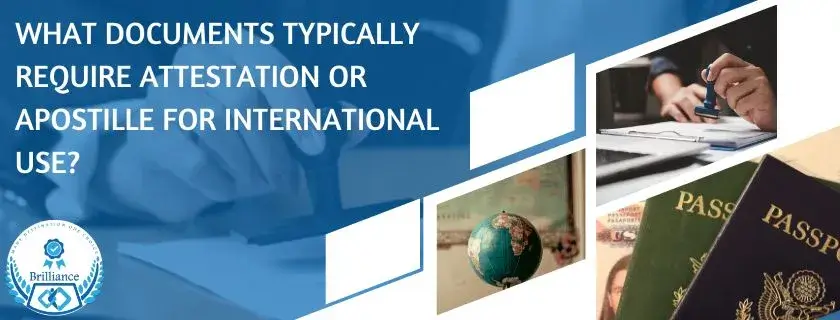
Which Documents Need Attestation or Apostille for International Use?
For certificates that one may need to use in another country whether for travel or business purposes may necessitate Attestation or Apostille. These processes are important that, by them, their authenticity is determined and the document is legalized in foreign countries.
Apostille:
In case of documents destined for countries which are signees to the Hague Convention of 1961 an apostille is a form of attestation which supersedes further consular legalization.
Attestation:
Documents originating from countries that are not party to the Hague convention have to be attested by various ministries of the originate country, and the country’s embassy or consulates.
Here are some types of documents that commonly require attestation or an apostille:
Birth and Marriage Certificates:
Birth and marriage are legal forms essential documents that are used in many formal occasions such as getting a visa, getting citizenship or marriage. Any certificate, which is used in support of application, must be notarized or legalized to certifying that the information used in the application is correct and that the certificate issued is genuine.
Educational Certificates:
Such documents could be diplomas and degrees, academic transcripts coupled with other documents formal certs. To use these documents, it is required to have an attestation or apostille of these education qualifications.
Legal Documents:
Certificates and legal documents such as Affidavit, Powers of Attorney and court judgments, legal documents, and other documents that need attestation or apostille. These papers are used to establish legal dealings or as a legal impression or capturing legal dealings or as affirmatory evidence of legal documents in a foreign nation.
Commercial Documents:
It is every commercial document like contracts, invoices and agreements may call for attestation or apostille for international trade or business. They require to be apostilled or legalized in order to act as legally enforceable documents in the country of destination.
Diplomatic Documents:
Documents like Diplomatic Certificates and Letters of Credential, are issued by the diplomatic missions and most of them are attested or apostilled. They are used to declare diplomatic immunity and identity of persons who hold diplomatic office.
Court Orders:
In cases of child custody, divorce, or Bankruptcy that has to be enforceable internationally.
Financial Agreements:
Business deals such as loans that require a legal review of the contract jurisdiction other than that of the borrower.
Commercial Invoice:
A document that has been legalized inexistence in the international market of the exported goods value and other features.
Bill of Lading:
A letter that gives information about the goods delivered for transport and needs to be signed to show it is original.
No Objection Certificates (NOC):
Some countries demand an NOC from employers or institutions before they can be granted visa or residency.
Divorce Certificate:
Needed for documents such as marriage licenses or applications for certain legal privileges in other country which require the Individuals to show evidence of legal annulment or divorce.
Death Certificate:
Required for solving any probate issues or for purposes of legal suit or to complete any transfers in other countries.
Professional Certifications:
Often when working overseas, the equivalent of a medical license or an engineering certification or teaching certificates may need to be attested.
Transfer Certificate:
May be required when taking children for studies in other schools in other countries.
Medical Documents:
Documents that need attestation or apostille include medical records, prescriptions, test results, and any other medical document that one needs to use in another country. We need to authenticate and legalized such documents as medical information stated should be accurate and dependable.
Travel Documents:
Various forms of travelling documents like passports, visas passports, immigration certificates, and permits, are supposed to be attested or have an apostille. Such documents have to be legalized and authenticated so that the intending traveller is issued with genuine travel documents in the country of destination.
For further clarification it should be mentioned that the requirements for Attestation or Apostille of the documents may differ according to the country where they are to be used, or to the purpose for which they are required. You must refer to Standards for documents that you want to use in the destination country to determine if attestation or apostille is applicable.
